And day by day this pining innocent
Thus to his father piteously did cry,
Till hunger had perform’d the stern
intent
Of their fierce foes. “Oh,
father, I shall die!
Take me upon your lap—my life
is spent—
Kiss me—farewell!” Then
with a gentle sigh,
Its spotless spirit left the suff’ring
clay,
And wing’d its fright to everlasting
day.
(He who has mark’d that wild, distracting
mien,
Which for this Count immortal Reynold’s
drew,
When bitter woe, despair, and famine keen
Unite in that sad face to shock the view,
Will wish, while gazing on th’ appalling
scene,
For pity’s sake the story is not
true.
What hearts but fiends, what less than
hellish hate,
Could e’er consign that group to
such a fate?)
And when he saw his darling child was
dead,
From statue-like despair the Count did
start;
He tore his matted locks from off his
head,
And bit his arms, for grief so wrung his
heart.
His two surviving babes drew near and
said,
(Thinking ’twas hunger’s thorn
which caus’d his smart,)
“Dear sire, you gave us life, to
you we give
Our little bodies—feed on them
and live!”
Like two bruis’d lilies, soon they
pin’d away,
And breath’d their last upon their
father’s knee;
Despair and Famine bow’d him to
their sway;
He died—here ends this Count’s
dark tragedy.
Whoso would read this tale more fully
may
Consult the mighty bard of Italy;
Dante’s high strain will all the
sequel tell,
So courteous, friendly readers, fare ye
well.
P. Hendon.
* * * * *
A LAPLANDER’S FAREWELL TO THE SETTING SUN.
(For the Mirror.)
Adieu thou beauteous orb, adieu,
Thy fading light scarce meets my view,
Thy golden tints reflected still
Beam mildly on my native hill:
Thou goest in other lands to shine,
Hail’d and expected by a numerous
line,
Whilst many days and many months must
pass
Ere thou shall’st bless us with
one closing glance.
My cave must now become my lowly home,
Nor can I longer from its precincts roam,
Till the fixed time that brings thee back
again
With added splendour to resume thy reign.
Iota.
* * * * *
ANCIENT VALUE OF BOOKS.
(For the Mirror.)
We have it from good authority, that about A.D. 1215, the Countess of Anjou paid two hundred sheep, five quarters of wheat, and the same quantity of rye, for a volume of Sermons—so scarce and dear were books at that time; and although the countess might in this case have possibly been imposed upon, we have it, on Mr. Gibbon’s authority, that the value of manuscript copies of the Bible, for the use of the monks and clergy, commonly was from four to five hundred crowns at Paris, which, according to the relative value of money at that time and now in our days, could not, at the most moderate calculation, be less than as many pounds sterling in the present day.




